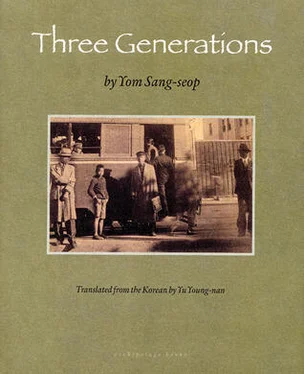Sang-hun had set up house with his concubine, but Deok-gi still had to decide what to do with the Suwon woman. The situation was a headache. She had left Deok-gi’s house with the child, telling him that they were going to stay at Sang-hun’s. Deok-gi had asked the tenants at the Taepyeong-dong house to move out as soon as possible, but the Suwon woman wasn’t interested. She stretched out her hand and demanded that he give her her due. She wanted it now and not — as her late husband’s will specified — after the three-year mourning period was over.
“Do you think your share will shrink if you don’t take it now? Will you need spending money for the next three years? It’s not as if I won’t provide you with food and other necessities. How can you go against my grandfather’s wishes when it’s been only a month since his death?”
“He could have made such a provision because he was afraid that I might not respect the three-year mourning period. Can’t you trust me?”
“ You are talking about trust? You’re the one who trusts no one — that ’s why you’re demanding your portion now.”
“Well, as they say, if your knife is mixed in with the knives from other households, it’ll be difficult to find it later. Family assets are strange. Who knows what may happen?”
They argued for two days. Deok-gi’s father came over the day the Suwon woman moved and ordered his son to open the safe. “Give what has to be given as soon as possible. There’s no use holding on to it. If she wants to go, she’ll go. If she cares enough, she’ll stay with our family for three years.”
And so the Suwon woman and her daughter received their shares. Deok-gi’s father took this opportunity to get his share of three hundred bags as well. After this was done, Deok-gi gave five hundred won to Secretary Ji, who asked if he could keep it for him. He wanted the money to be used for his own funeral and if anything was left over, he asked that it be given to his only daughter. Deok-gi told him not to worry about his funeral expenses and urged him to take the money and use it as he saw fit. Ji declined the offer and told Deok-gi to hold onto it, because he had nowhere to spend it and his daughter was not exactly starving.
Tongues wagged about how Deok-gi’s father splurged on setting up house with his concubine, how he drove out his lawful wife, and how abominably the Suwon woman behaved. But now that Deok-gi had put the matter to rest — now that his mother was living with him and his father and the Suwon woman had settled down as they wished — things appeared to take a quieter course.

With the renewed calm, Deok-gi began to think of resuming his studies, and he soon made plans to leave for Kyoto after the coming month’s first-day rite. He hadn’t prepared for his examinations and would probably have to sit for a makeup test, but he was hoping to graduate and enter Keijo Imperial University. It would take only two months, including travel. When the time came and he was ready to leave, he came down with a fever. He wasn’t sick enough to stay in bed, so he took a couple of doses of Secretary Ji’s Chinese medicine, which Ji had concocted for him with the skills he had honed while caring for Deok-gi’s grandfather. Deok-gi’s fever, however, didn’t subside. His body ached all over from exhaustion, which wasn’t surprising, given the pressure of the funeral, his late-night outings to help Byeong-hwa, and the stress of settling various household affairs. Several days had passed since the evening he began to feel ill, but he hadn’t gotten any better. Byeong-hwa learned that Deok-gi was sick and came by to see how his friend was feeling. Although trembling with a high fever, Deok-gi was full of questions: “How’s business? Are detectives still on your case? Is Pil-sun’s father doing all right?”
When Byeong-hwa returned to the store, he told Pil-sun that Deok-gi had asked after her father. Though pleased, she said with some anxiety, “He’s done so much for us, and I can’t even go see him!”
Byeong-hwa didn’t encourage her to visit him. Byeong-hwa and Won-sam took turns visiting Deok-gi every morning and evening, but Pil-sun couldn’t muster the nerve to join them, though her heart ached for him.
Several days later, after returning from a visit to Deok-gi, Byeong-hwa said, “How about taking him a fruit basket, Pil-sun?”
Pil-sun’s face lit up but she was hesitant. First of all, what should she wear? It would be different if she were seeing him in a hospital, but how could she go to such a grand house?
Byeong-hwa said, “There’s nothing to worry about. People live there, too. Go on. He asked me to send some fruit, and I said I would.” He began to fill a basket with tangerines, apples, and pears.
“He asked for some fruit?”
“Yes.”
“Then let’s ask Won-sam to take it over when he comes back from his delivery.”
“It doesn’t make a difference who takes it. But if you go, it’d give you a chance to express your thanks.” Deok-gi had actually said that he’d like to see Pil-sun, but Byeong-hwa was reluctant to tell her that. He didn’t mean to prevent her from getting close to Deok-gi, but he was afraid that Deok-gi might stir her young heart.
“You’re worrying about your clothes, aren’t you? Don’t be ridiculous. Is there a rule that you have to wear a silk skirt to go to a rich man’s house? Actually, people would think it odd if a grocer showed up in such finery.”
Though it embarrassed Pil-sun that Byeong-hwa knew what she was thinking, she set her fears aside. She figured the right thing to do was pay her respects, and she set off.
Following Byeong-hwa’s directions, she got off the streetcar on Hwanggeumjeong at the intersection of Gurigae, turned toward Suhajeong, and soon arrived at the magnificent gate with a curved roof. With her heart thumping and her neck drawn taut, she dawdled, unable to find the courage to call out or enter the house. Eventually the maidservant emerged with what looked like a bowl of rice under her apron. Noticing Pil — sun, she asked, “What do you want?”
Pil-sun was relieved to be rescued from her dilemma — there was no way she could run away now. “I brought some fruit from Sanhaejin — from Hyoja-dong.” Unexpectedly, her words came out confidently, for she was telling herself that she had come on Byeong-hwa’s behalf, not to pay a visit to her acquaintance.
“Take it inside, please.” The maid began to walk away.
“Excuse me, but could you take it in for me?” The maid was eager to get back into her room and out of the bitter cold.
Pil-sun figured that if she could just leave it behind, Deok-gi would know that she had come to pay her respects. That would be better than having to face him. The maid went inside with the basket, and although Pil-sun wanted to hear what Deok-gi would say, she ran off as if someone were chasing her.
It didn’t seem possible that Deok-gi could be the owner of such a grand mansion. Hadn’t he come to the store without pomp, wearing a student uniform decorated with gold-plated buttons, and eaten beef soup from a chipped tray? She wished that Deok-gi had no money. She couldn’t understand why such a fortunate young man from a rich family would fraternize with Byeong-hwa and deign to befriend someone like her. This young woman found nothing remarkable about wishing Deok-gi were penniless. What she did find remarkable was that Deok-gi was so down-to-earth.
Pil-sun hastened her step, suppressing the temptation to look back.
“Hey! Wait a minute!” the maidservant called out breathlessly from behind. Pil-sun spun around.
Читать дальше













